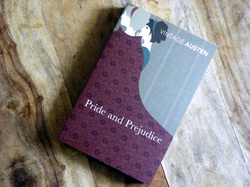
Pride and Prejudice is about impressions: first impressions, mistaken impressions, false impressions, impressing and being impressed. Dig into well-written themes and we recognize and honor universal truths. The environmental details and historical context of Austen's time have changed but the novel's themes are still with us. Austen captures the truths of a flawed humanity.
For our discussion, we will be looking at how impressions lead to pride and prejudice of various characters. Think about scenes in the book that demonstrate how impressions affect the pride and prejudice of various characters.
Recommended reading:
- Pride and Prejudice by Jane Austen
- Celebrating Pride and Prejudice: 200 Years of Jane Austen's Masterpiece by Susannah Fullerton. This book is written for the general reader who wants background information on Pride and Prejudice. It has a wealth of information on why Pride and Prejudice is Austen's favorite novel.
- The JASNA web site has a list of articles from their journal Persuasions for those who wish to pursue scholarly information.
Please add comments below to get our discussion started!
Elizabeth, a new heroine
Into this society steps a brand new heroine, someone new and memorable in the world of fiction. Elizabeth Bennet is 20 years old, can expect no fortune, and has little formal education. Her figure is light and pleasing, she is of average height, has tolerable teeth and beautiful dark eyes. She is moderately accomplished and can play and sing pleasantly, and is reasonably well read. Elizabeth is admirable but not faultless, fun but not unrestrained, accomplished but not a paragon, courageous but not heroic. Her mind is quick and she is witty and clever. Physical exercise is important to her. She performs no memorable or heroic action. She dares to speak her mind. Elizabeth's outrageous unconventionality constantly verges on impertinence and impropriety. She is always interesting to listen to and is ready to laugh at foolishness. She is revolutionary in her ideas of women and of class. She believes that a man's character is worth more than his standing in society. She believes women have every right to be happy as men and that women should marry for love, not only for economic security. Her intelligence, wit, honesty, and virtue enable her to rise above the superficial concerns and bad behavior pervading her spiteful and status driven society. Her temper is to be happy, and it is her readiness for happiness, enjoyment, and pleasure that make her and her novel so distinctive. Elizabeth is a believable and convincing character. Some contemporary readers found her too novel; she was highly unconventional and they were astonished.
Elizabeth is a mixture of her sense of fun, her loving and loyal personality, her spirit, her independence and self-sufficiency, and her love of playing with words. We admire Elizabeth because she is rebellious, but also because she recognizes her own faults. She wants to be treated as a rational creature speaking truth from her heart. She is always interesting to listen to and is ready to laugh at foolishness. We admire her archness and sweetness of manner and that her sense and conduct are superior to the common heroine. She points out the comedic elements of forcing a well-bred and educated woman to be groomed to fill the subservient roll that society allows.
Elizabeth is also admired for her strengths. She has physical strength, rare in novels of Austen's day. She takes long walks, jumps over stiles, and springs over puddles with impatient activity. Elizabeth has strength of character when coping with adversity. If insulted, she uses humor as a weapon and does it brilliantly. When challenged, she challenges back. Elizabeth is the reason P&P is “light and bright and sparkling”. She has depths that take many readings to fully comprehend. She flouts convention and refuses to bow down to Lady Catherine when she pulls rank. She can be unexpected, she teases Darcy, needling him and probing his character. She makes him smile and prods him to re-evaluate his assumptions as she questions her own preconceptions. Her lack of conventionality and depth of character soon bewitch him.
Austen tells her story through Elizabeth's eyes so it is easy to identify with this heroine who is lovable as much for her faults as for her charms. Austen lets us decide for ourselves Elizabeth's character as she slowly reveals it as the story unfolds. Elizabeth is capable of making mistakes, but having realized her errors, she changes and grows as a result. She is constantly being educated, challenged, and changed. She learns that her first impressions are not always correct. Elizabeth must learn to eliminate both pride and prejudice before she is ready for a happy ending. She becomes a superior person morally, emotionally, and intellectually. We are blessed with a happy ending in which a woman finds love, fortune, and happiness by being herself.